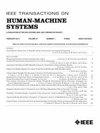运营商、技术和系统的复原力
IF 4.4
3区 计算机科学
Q2 COMPUTER SCIENCE, ARTIFICIAL INTELLIGENCE
引用次数: 0
摘要
技术的变化,特别是商业航空运营中的技术变化,导致相关安全程序和检查表的数量和种类逐步增加。这项工作涉及人们和系统如何应对意外事件的问题,适用于此类商业航空运营,并研究这些 "如果-那么 "方法是否足以应对未来的运营不确定性。目前的工作借鉴了有关系统恢复能力、认知灵活性和适应性的文献,以考虑将应对策略纳入各级操作的人机培训中,如何帮助有效解决此类意外事件。在当前和未来的作战环境中,许多科学见解、方法和领域都可用于避免灾难性故障。虽然启发式建议确实提供了初步的防御保护,但不断发展的空域运行需要适应新出现的、甚至是意料之外的挑战,并具有应变能力。前瞻性的应对战略既要包括可以明显预见的需求,也要包括目前仍不确定的需求。应变能力似乎是成功应对这些挑战的一个主要方面。本文所提炼的信息可以提高操作员的绩效和航空系统对非程序化和未预见到的事件的反应能力,并可应用于这一领域之外的大量其他安全关键操作。本文章由计算机程序翻译,如有差异,请以英文原文为准。
Resilience in Operators, Technologies, and Systems
Changes in technology, particularly for example in commercial air operations, have led to incremental increases in the number and variety of associated safety procedures and checklists. This work addresses concerns about how people and systems respond to unanticipated events, as applicable to such commercial air operations, and to examine whether these “
if–then
” approaches prove sufficient to respond to prospective operational uncertainties. The current work draws from the literature on systems resilience, cognitive flexibility, and adaptation to consider how response strategies that are integrated into human–machine training at all levels of operation can aid in effective resolution to such unanticipated events. A number of scientific insights, methods, and domains are identified as being able to be employed to avoid catastrophic failure in current and prospective operational environments. While heuristics for advisement do provide an initial level of defensive protection, evolving airspace operations need to be adaptive to, and resilient in respect of, emerging and even unanticipated challenges. Prospective response strategies need to encompass both the demands that can be evidently foreseen and those that remain at present, indeterminate. Resilience in responding appears to be a primary dimension of success in relation to these challenges. The information herein distilled can increase operator performance and aviation systems’ response to nonproceduralized and unanticipated events as well as being applied to a vast array of other safety-critical operations beyond this one realm.
求助全文
通过发布文献求助,成功后即可免费获取论文全文。
去求助
来源期刊

IEEE Transactions on Human-Machine Systems
COMPUTER SCIENCE, ARTIFICIAL INTELLIGENCE-COMPUTER SCIENCE, CYBERNETICS
CiteScore
7.10
自引率
11.10%
发文量
136
期刊介绍:
The scope of the IEEE Transactions on Human-Machine Systems includes the fields of human machine systems. It covers human systems and human organizational interactions including cognitive ergonomics, system test and evaluation, and human information processing concerns in systems and organizations.
 求助内容:
求助内容: 应助结果提醒方式:
应助结果提醒方式:


